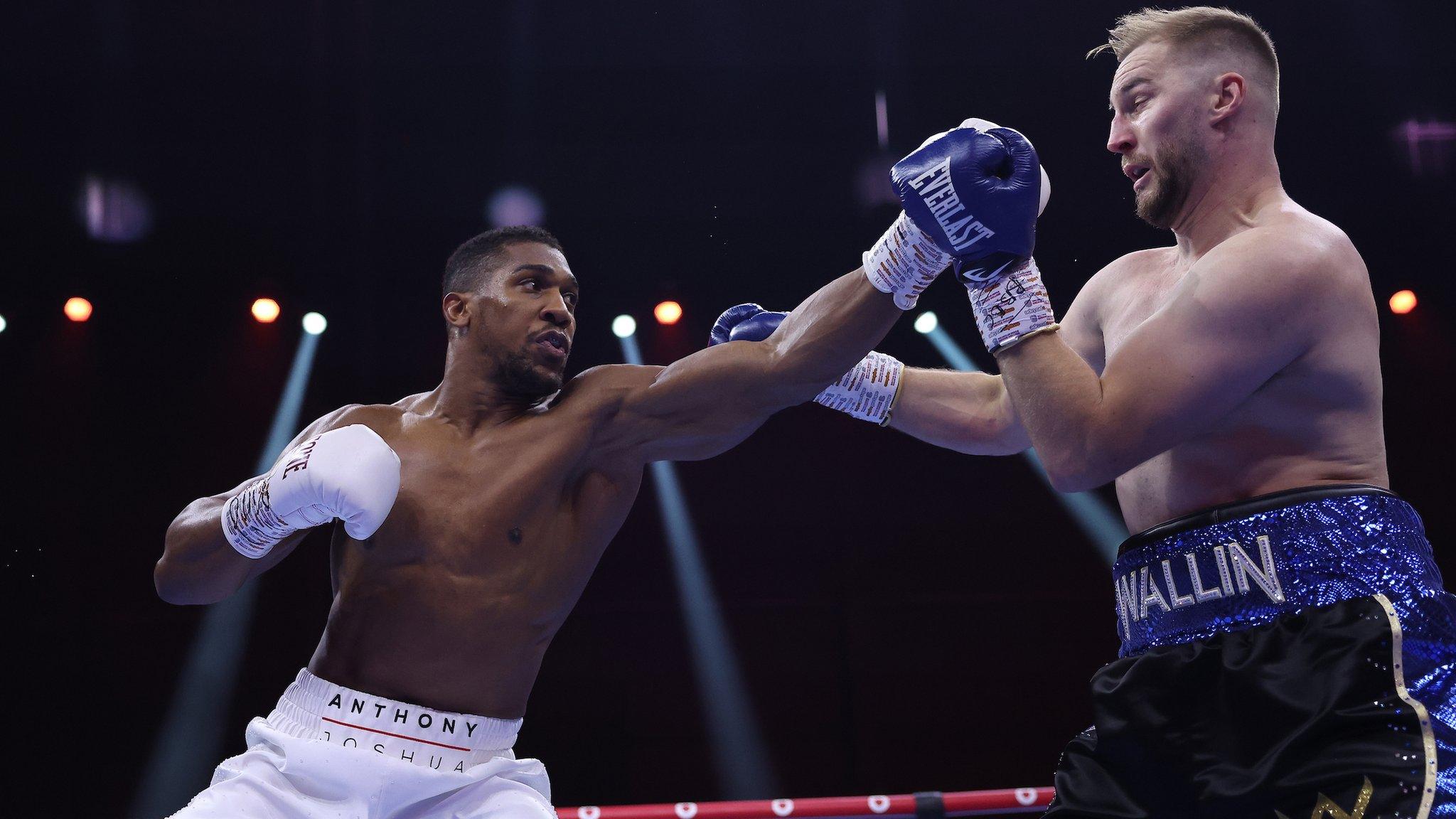Fury v Usyk & Crawford v Spence - why are big fights not happening?
- Published
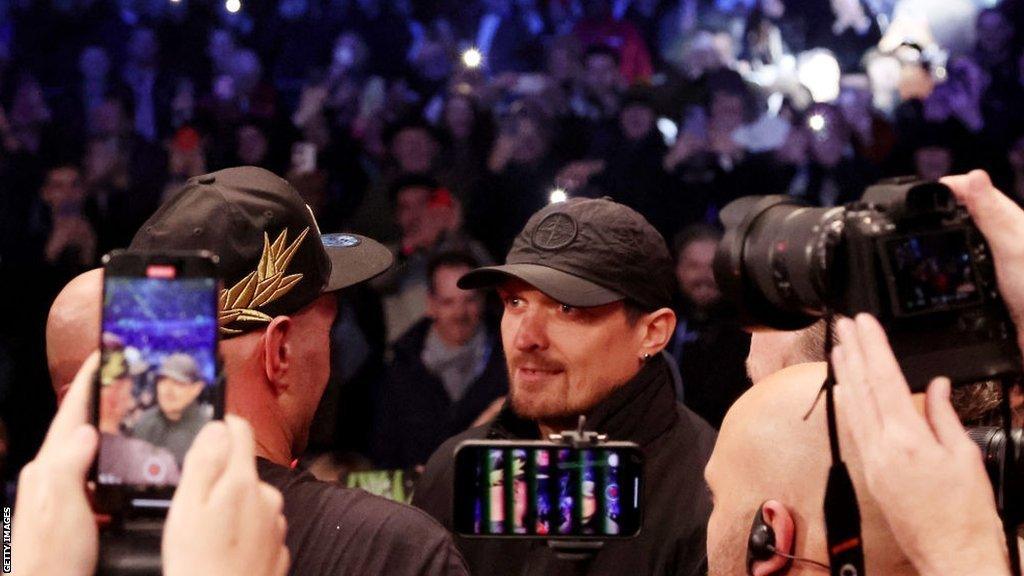
Ukraine's Oleksandr Usyk (right) holds the WBA, IBF and WBO heavyweight titles and Tyson Fury of Britain is the WBC champion
Tyson Fury v Oleksandr Usyk and Anthony Joshua v Deontay Wilder featuring on the same card on the same night?
Promoter Eddie Hearn has said representatives in the Middle East want to host an unparalleled heavyweight event at the end of the year in a deal that could exceed $400m (£320m).
"It will take an awful lot of money, which is abundant in the Middle East, so it shouldn't be ruled out," says Matt Christie, editor of Boxing News, the world's longest-running active boxing magazine.
"Talks are ongoing and are genuine. But as we know, talking is one thing, getting fighters to agree is quite another."
After the failure to negotiate an undisputed fight between champions Usyk and Fury, many boxing buffs are sceptical.
Is this just another delaying tactic to deflect the conversation away from an issue many feel is threatening the sport's future?
The biggest fights - those with the potential to capture the general public's imagination and attract new enthusiasts - are rarely being delivered.
"Without the best fights happening, boxing will fall over," promoter Ben Shalom says. "It's the biggest turn off for fans."
BBC Sport looks at why 'super fights' are so difficult to make and the impact it has on the sport's popularity and credibility.
'It's going to kill the sport'
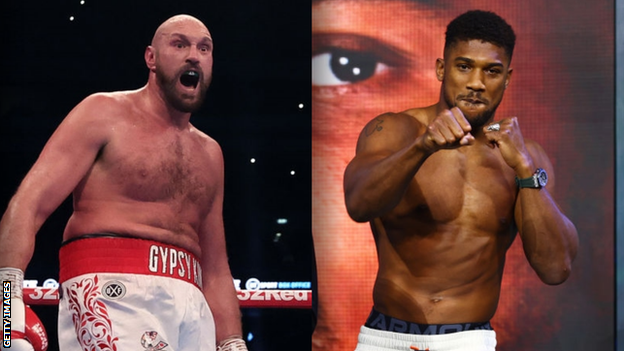
WBC champion Fury (left) and former champion Joshua have been close in the past to agreeing an all-British contest
Everyone from traditionalists to casual fans were clamouring for an iconic bout between WBC belt holder Fury and WBA (Super), IBF and WBO champion Usyk.
It was almost agreed for 29 April at Wembley Stadium... but fell through.
Boxxer promoter Shalom hopes it is a "watershed moment" and leads to much-needed change.
"Hopefully we can step back and say 'why is this happening?'," he says. "Because it's going to kill the sport."
The Fury-Usyk saga is merely the latest instalment in an unwanted narrative becoming all too familiar in boxing.
On more than one occasion, a monumental all-British meeting between Joshua and Fury has collapsed.
When Joshua was unified champion, an undisputed contest with American Wilder never materialised over purse disputes.
"Boxing will always survive but when there is so frequently a failure to make the right fights, particularly in the heavyweight division, it does nothing for the sport's reputation," Christie says.
"Hardcore fans are used to the disappointment.
"But trying to explain why two boxers can't just have a fight to the general public is very difficult," adds Christie, who says the "constant teasing of information" about fights on social media inflames the problem.
Unified light-middleweight champion Natasha Jonas, who recently failed to reach terms with Claressa Shields, says social media is a double-edged sword when it comes to making fights happen.
"It's easy to start having a go on social media. Everyone is like 'fight, fight, fight' - it's like school playground behaviour," she says.
"Social media has made it easier to start a rivalry to get fans interested, but everyone getting little bits of information is not helpful in getting business done."
Who is the A-side?
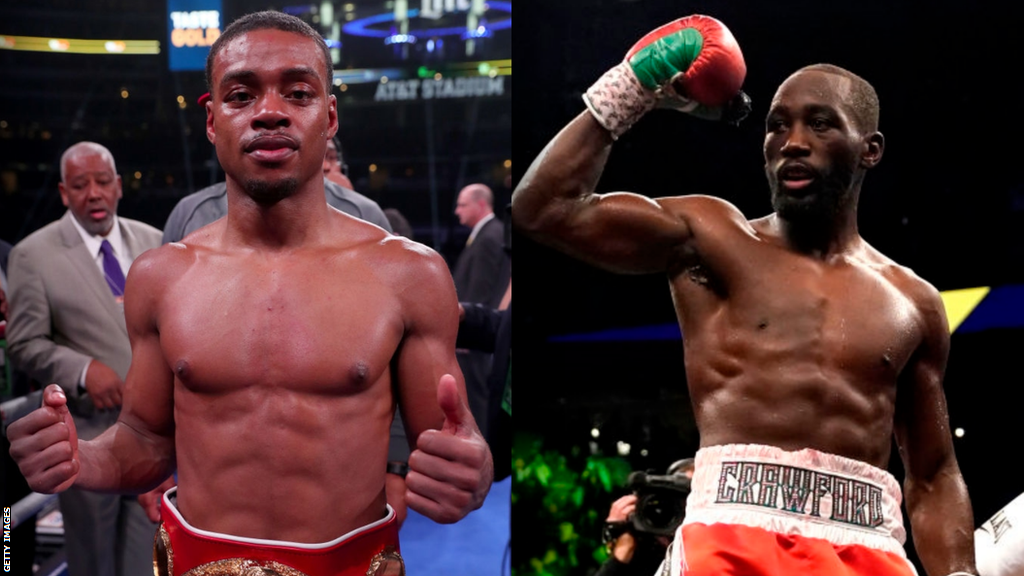
American stars Errol Spence Jr (left) and Terence Crawford are yet to agree an undisputed welterweight fight
Contractual disputes often boil down to which fighter is considered the bigger draw - the 'A' side - and therefore deserves the bigger portion of cash.
Usyk may have more belts, but Fury is arguably better known by the wider public. But to quantify levels of popularity in terms of a split in the revenue is contentious.
"Commercial value is one of the biggest reasons fights don't happen. Just because fans want to see it, a lot of things need to happen," Jonas says.
"What's the split? What channel? That is always a big thing. Whose network is going to get to put it on?
"We're in a prize-fighting sport - that's literally the point. We have to make as much money as we can. It's a very short career."
Boxing's fractured structure can complicate matters, with the four main sanctioning bodies - WBA, WBC, WBO and IBF - having its own world champion and rankings.
"If there was one title and therefore one champion, there would be very few options for a boxer who wanted to be regarded as the best," Christie says.
"But with four titles, it's very easy to find an alternative way to call themselves 'world champion'."
A champion with multiple belts, will have more than one mandatory challenger. So, Usyk had only a small window to negotiate with Fury before a mandatory fight was ordered.
"It doesn't help that each of the sanctioning body rankings are so wildly different, despite everyone being privy to the form of the boxers," Christie says.
"Can anyone explain to me why Daniel Dubois was the leading WBA contender when WBO mandatory Joe Joyce was unranked by the WBA despite beating Dubois the year before?
"This kind of nonsense occurs all the time and nobody ever challenges the absurdity of it."
Who is to blame?
Both Jonas and Northern Ireland's two-weight champion Carl Frampton have little doubt where the fault lies.
"Promoters are probably the main reason fights aren't really happening," Frampton says. "It's all a bit of a mess. They need to have a relationship with each other."
"Sometimes there's a bit of ego involved. People flex their muscles. It's hard work," adds Jonas.
Christie disagrees.
"It's unfair to pin the blame solely on promoters," he says.
"They stand to make an awful lot of money from these bouts so to suggest they're not doing everything to get them over the line is untrue.
"It's rarely the demand of a promoter that's the sticking point; it's a purse split, it's a rematch clause, it's who is the A-side."
What is the answer?
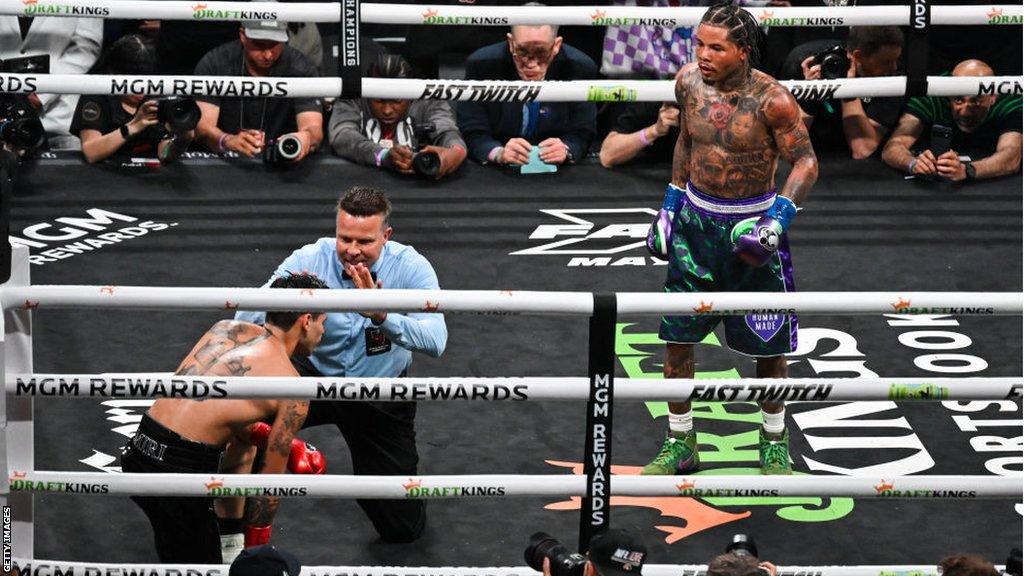
Gervonta Davis (right) beat Ryan Garcia in arguably the most anticipated fight of 2023
There is no framework in boxing that demands the best must fight the best. Fights are almost entirely at the discretion of the boxer and their team.
And it's not just the heavyweight division that is the problem. A blockbuster between welterweights Terence Crawford and Errol Spence Jr or an undisputed light-heavyweight fight between undefeated Russians Dmitry Bivol and Artur Beterbiev are high on boxing fans' wish lists.
The super-fight between Americans Ryan Garcia and Gervonta Davis - which reportedly did around a million USA pay-per-view buys - took place this month and offers hope.
"We regularly get supreme matchups and unifications at flyweight and super-flyweight," Christie adds.
"Why? Because they're not nearly as marketable as heavyweights - therefore to earn the most money, they simply have to fight their closest rivals.
"It's a similar scenario in the female code. For the women to earn big money, and to attract big audiences, efforts are always made to make the best possible contests."
So what is the answer?
"What's obvious is the current negotiating system is not fit for purpose," Christie says.
"One overriding body with one set of rankings, champion, set of rules and drug-testing system would eradicate many of boxing's problems," Christie says.
"But it's a huge ask. Who has the money to establish such a body and, moreover, who has that money and hasn't earned it in a shady way?"
Christie suggests for the biggest fights an independent arbitrator could be assigned to oversee the negotiations "who has worked out a fair split, that is not up for discussion, depending on the fight's location".

Which pair will finish first? A frenetic race across Canada without phones and flights
Bound by fate, a car accident and a dog! A warm-hearted Aussie rom-com about a flawed, funny couple getting it all utterly wrong

Related topics
- Published14 January 2024
